Abstract
A 32-year-old thin woman is complaining of weakness and light-headedness. She denies vomiting and intake of medications except vitamins. On physical examination she has a blood pressure of 100/60 mmHg with a heart rate of 95 beats/min and diminished skin turgor. The remainder of her exam is unremarkable. Laboratory data are shown in Table 13.1.
Access this chapter
Tax calculation will be finalised at checkout
Purchases are for personal use only
References
Stone DJ. Respiration in man during metabolic alkalosis. J Appl Physiol. 1962;17:33–7.
Javaheri S, Kazemi H. Metabolic alkalosis and hypoventilation in humans. Am Rev Respir Dis. 1987;136:1011–6.
Hodgkin JE, Soeprono FF, Chan DM. Incidence of metabolic alkalemia in hospitalized patients. Crit Care Med. 1980;8:725–8.
Anderson LE, Henrich WL. Alkalemia-associated morbidity and mortality in medical and surgical patients. South Med J. 1987;80:729–33.
Galla JH. Metabolic alkalosis. J Am Soc Nephrol. 2000;11:369–75.
Rosen RA, Julian BA, Dubovsky EV, Galla JH, Luke RG. On the mechanism by which chloride corrects metabolic alkalosis in man. Am J Med. 1988;84:449–58.
Gifford JD, Ware MW, Luke RG, Galla JH. HCO3− transport in rat CCD: rapid adaptation by in vivo but not in vitro alkalosis. Am J Physiol. 1993;264:F435–40.
Wagner CA, Finberg KE, Stehberger PA, Lifton RP, Giebisch GH, Aronson PS, Geibel JP. Regulation of the expression of the Cl−/anion exchanger pendrin in mouse kidney by acid-base status. Kidney Int. 2002;62:2109–17.
Riccio JF, Irani FA. Posthypercapnic metabolic alkalosis: common and neglected cause. South Med J. 1979;72:886–7.
Simonetti GD, Mohaupt MG, Bianchetti MG. Monogenic forms of hypertension. Euro J pediatr 2011;14 March online first.
Sontia B, Mooney J, Gaudet L, Touyz RM. Pseudohyperaldosteronism, liquorice, and hypertension. J Clin Hypertens (Greenwich). 2008;10:153–7.
Kaufman AM, Kahn T. Potassium-depletion alkalosis in the rat. Am J Physiol. 1988;255:F763–70.
Chen YS, Fang HC, Chou KJ, Lee PT, Hsu CY, Huang WC, Chung HM, Chen CL. Gentamicin-induced Bartter-like syndrome. Am J Kidney Dis. 2009;54:1158–61.
Chadha V, Alon US. Hereditary renal tubular disorders. Semin Nephrol. 2009;29:399–411.
Patel AM, Goldfarb S. Got calcium? Welcome to the calcium-alkali syndrome. J Am Soc Nephrol. 2010;21:1440–3.
Litchfield WR, New MI, Coolidge C, Lifton RP, Dluhy RG. Evaluation of the dexamethasone suppression test for the diagnosis of glucocorticoid-remediable aldosteronism. J Clin Endocrinol Metab. 1997;82:3570–3.
Fraser R. Disorders of the adrenal cortex: their effects on electrolyte metabolism. Clin Endocrinol Metab. 1984;13:413–30.
Shimkets RA, Warnock DG, Bositis CM, Nelson-Williams C, Hansson JH, Schambelan M, Gill Jr JR, Ulick S, Milora RV, Findling JW, et al. Liddle’s syndrome: heritable human hypertension caused by mutations in the beta subunit of the epithelial sodium channel. Cell. 1994;79:407–14.
Eiro M, Katoh T, Watanabe T. Use of a proton-pump inhibitor for metabolic disturbances associated with anorexia nervosa. N Engl J Med. 2002;346:140.
Aichbichler BW, Zerr CH, Santa Ana CA, Porter JL, Porter JL, Fordtran JS. Proton-pump inhibition of gastric chloride secretion in congenital chloridorrhea. N Engl J Med. 1997;336:106–9.
Author information
Authors and Affiliations
Corresponding author
Editor information
Editors and Affiliations
Rights and permissions
Copyright information
© 2013 Springer Science+Business Media New York
About this chapter
Cite this chapter
Ortega, L.M., Lenz, O. (2013). Metabolic Alkalosis. In: Lerma, E., Rosner, M. (eds) Clinical Decisions in Nephrology, Hypertension and Kidney Transplantation. Springer, New York, NY. https://doi.org/10.1007/978-1-4614-4454-1_13
Download citation
DOI: https://doi.org/10.1007/978-1-4614-4454-1_13
Published:
Publisher Name: Springer, New York, NY
Print ISBN: 978-1-4614-4453-4
Online ISBN: 978-1-4614-4454-1
eBook Packages: MedicineMedicine (R0)

